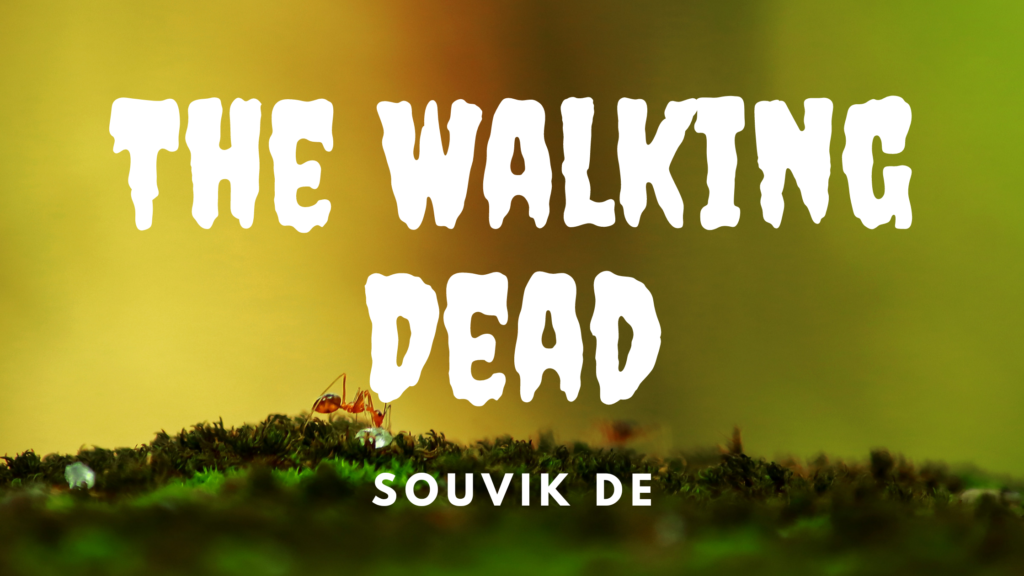
In Nature, Life and Death are recurrent and intertwined concepts. So, today, let us talk about the cycle of life and death. Or, more specifically, the beginning of a new life by claiming a different one.
A conversation between two friends-
A: X has not been showing up at work for some days. Did you notice how oddly X had been behaving off late? I wonder what’s wrong.
B: Yeah! He rummaged here and there at work hours and his appetite, too, was abnormal. Did he visit the forbidden part of the jungle!?
A & B start searching for X in the jungle. To their awe they find X in a leaf, 25 cm above from the forest floor. Its mandibles clasping the base and some type of organism protruding form its head…
Well, the organisms mentioned previously are leafcutter ants—sorry to disappoint! We all adore zombie movies, right? Now, what if I tell you there are some parasites found infecting arthropods and turning them into zombies? Well, sort of. Yes, monsieur and mademoiselle I present to you— Ophiocordyceps, a type of parasitic fungus that hijacks the body of insects and uses them as they please.
Ophiocordyceps– the puppeteers
Ophiocordyceps undergo this stunning mechanism just for one goal: self-propagation and dispersion of spores. Their habitat is the forever hot and humid tropical rain forests. These fungi infect ants by attaching their spores to the ant’s body which eventually penetrates the insect’s exoskeleton. The penetration by the spore radically changes the infected ant’s behavior- it now obeys the fungi. Since Ophiocordyceps need a humid climate for propagation, it puppeteers the ant to move to a humid microclimate where the parasite can grow easily.
The parasite effectively disarranges limb coordination of the host and infects the host’s brain. Sounds intriguing, right? After a cordyceps infection, the brain of the ant remains functional but its body violates the brain’s commands. Meanwhile, the usurper feeds on its host’s body and releases chemicals that cause the muscles of the ant to contract. On a leaf or a branch of a tree, the affected ant makes its last stand as it clasps its jaws into it and waits to die.

After reaching a suitable environment, the fungus begins to reproduce. Its fruiting body sends up long stalks through the head of the dead ant which eventually produces spores. These spores have the potential to further infect a colony of ants and, in time, rain down to zombify more.
Recent findings suggest similar infections in cicada, flies or wasps, although with lesser severity in comparison with ant infections. As ants live in large packed colonies, even one infected ant can wipe out an entire anthill. So, if an ant shows any sign of weakness, its colony mates kill it. This altruistic behavior saves the rest of the colony from the vicious fungus.
A team of researchers led by David Hughes has sequenced the genome of the Ophiocordyceps unilateralis fungi. Interestingly, they have discovered some unique genes that code for cholera-like toxins. These genes are not commonly found in other fungi species. The toxins are a group of enterotoxins that messes up the chemical communication system of ants. Throwing some light on the functioning of the brain of the ‘zombie’ ants, it was found that during the clasping event, almost half of the infected ant’s brain cells were actually the cells of the parasite. At this point the unique genes of the fungi come into play. These are the genes that actually control the ant. Wonder how?
What causes behavioral changes in the hosts?
Hughes and his team found abnormal levels of serotonin, dopamine and noradrenalin like neurotransmitters in the body of the zombie ants. Serotonin depletion in ants hampers their foraging activity and has hallucinogenic effects. Thus, by manipulating the neurotransmitters, the intruder slowly takes control of the host body and changes its behaviour. Some genes alter the circadian rhythm of the ant, causing it to leave the nest at odd times. The ant becomes hyperactive over time and reaches its place of death. When the ant succumbs, the next phase of fungal reproduction starts. The parasitic fungus activates several genes that destroy the immune system of the ant completely so that the fungus can grow easily. Fungal cells reproduce rapidly within the carcass and eventually, they start to develop the reproductive stalk. Fascinating, isn’t it?

Cordyceps fungi exploded from a body of a Carpenter ant (Pic credit: João Araújo) 
Cordyceps on a fly in the Adolfo Ducke Forest (Picture Credit: João Araújo)
In reality, only a few ants in a colony can be infected by the parasite at a given time. To balance an ecosystem the fungus keeps the host population in check.
A colony of ants is moving to find a new habitat. On their way, they find another dead, mummified colony of ants. Strange stalks protrude out of the dead ants and in the cool air, some kinds of spores start raining down on the passing colony. Suddenly the ants went berserk…
Nah, that kind of scenario is highly unlikely. It might be a script for a brand-new zombie film but won’t happen in reality, though.
By Souvik De, IISER Kolkata.
Edited by Anuja Bothra.
Read also:
References:
- Zombies Thrived on Ancient Earth By Elsa Youngsteadt www.sciencemag.org/news/2010/08/scienceshot-zombies-thrived-ancient-earth
- Parasitic Puppeteers Begin to Yield Their Secrets Elizabeth Pennisi science.sciencemag.org/content/343/6168/239
- Evaluating the tradeoffs of a generalist parasitoid fungus, Ophiocordyceps unilateralis, on different sympatric ant hosts. Wei-Jiun Lin, Yung-I Lee, Shao-Lun Liu, Chung-Chi Lin, Tan-Ya Chung & Jui-Yu Chou
- de Bekker, C., Ohm, R.A., Loreto, R.G., Sebastian, A., Albert, I., Merrow, M., Brachmann, A. and Hughes, D.P. Gene expression during zombie ant biting behavior reflects the complexity underlying fungal parasitic behavioral manipulation, BMC Genomics, 16:620, 1-23 (2015). DOI 10.1186/s12864-015-1812-x.
- Zombie’ Parasite Takes Over Insects Through Mind Control | National Geographic
About the author:

I am Souvik De. Currently, I am a First-year BS-MS student of IISER Kolkata. I have a fascination with Biological Sciences. I love to read fictions, nonfictions and listen to Metallica in my leisure times. I am a huge supporter of Manchester United.
4 thoughts on “The Walking Dead”